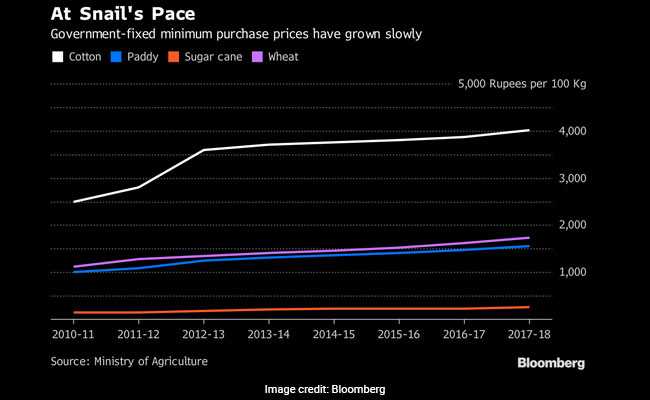
The farmers reached Mumbai after marching almost 200 kilometers.
Nearly 50,000 farmers gathered in Mumbai today demanding loan waivers and higher crop prices despite Prime Minister Narendra Modi's promise to ensure a 50 percent return over production costs before the national election in 2019.
The farmers reached Mumbai after marching almost 200 kilometers (124 miles) for nearly a week from Nasik to protest outside the state assembly, according to Ashok Dhawale, president of the All India Kisan Sabha, which is leading the protest. The city's police control room, however, said the assembled crowd numbered 10,000 to 12,000. Maharashtra is the country's second-biggest producer of cotton and sugar cane and third-biggest grower of pulses.
The protest is the latest challenge for PM Modi who promised to double farm incomes by 2022, sensing the agitation among farmers amid falling food prices and high debt levels. They are a key support base for political parties as 800 million of India's 1.3 billion population depend directly or indirectly on agriculture for their livelihood.
Bumper harvests, boosted by good rain in 2016 and 2017 after back-to-back droughts, have hurt their incomes due to a supply glut. "We want to draw the government's attention to our plight. Costs of farming have become unsustainable, said Kishore Tiwari, president of the Vidarbha Jan Andolan Samiti, one of the organizations taking part in the protest. "It's no longer feasible to live in villages and sustain our families. The idea is to now sit before the seat of power and ask them to change their policies."
Slew of Demands
Farmers are demanding a broader debt waiver program after some of them failed to qualify for any financial relief under the Maharashtra government's initiative last year. Other major demands include better prices for their crops, changes in a river-linking program in the state to ensure that tribal villages are not submerged, halting the acquisition of farmers' lands for the bullet train and the super highway projects and compensation for losses due to pest attacks and hailstorms.
 "The last four years have been a relentless cycle of distress," Said Vilas Babar, a 41-year-old farmer from Surpimpri village in Buldhana district, adding he borrowed 500,000 rupees ($7,694) from a state-owned bank after droughts for a couple of years and failed to repay as prices of agricultural commodities fell following a good monsoon. "We're walking under the harsh sun. What choice do farmers have?"
"The last four years have been a relentless cycle of distress," Said Vilas Babar, a 41-year-old farmer from Surpimpri village in Buldhana district, adding he borrowed 500,000 rupees ($7,694) from a state-owned bank after droughts for a couple of years and failed to repay as prices of agricultural commodities fell following a good monsoon. "We're walking under the harsh sun. What choice do farmers have?"
The government plans to increase its minimum support prices of monsoon-sown crops such as rice, soybeans, cotton and pulses by more than 50 percent of the production cost, Finance Minister Arun Jaitley said in February while presenting the government's budget for the financial year beginning April 1.
Cotton farmers in Maharashtra have lost about 12,000 crore rupees after pink bollworm damaged crops, Mr Dhawale said. The number of farmers committing suicides in India climbed about 42 percent to 8,007 in 2015 from a year earlier, according to a federal central farm ministry statement in parliament in February.
The farmers reached Mumbai after marching almost 200 kilometers (124 miles) for nearly a week from Nasik to protest outside the state assembly, according to Ashok Dhawale, president of the All India Kisan Sabha, which is leading the protest. The city's police control room, however, said the assembled crowd numbered 10,000 to 12,000. Maharashtra is the country's second-biggest producer of cotton and sugar cane and third-biggest grower of pulses.
The protest is the latest challenge for PM Modi who promised to double farm incomes by 2022, sensing the agitation among farmers amid falling food prices and high debt levels. They are a key support base for political parties as 800 million of India's 1.3 billion population depend directly or indirectly on agriculture for their livelihood.
Bumper harvests, boosted by good rain in 2016 and 2017 after back-to-back droughts, have hurt their incomes due to a supply glut. "We want to draw the government's attention to our plight. Costs of farming have become unsustainable, said Kishore Tiwari, president of the Vidarbha Jan Andolan Samiti, one of the organizations taking part in the protest. "It's no longer feasible to live in villages and sustain our families. The idea is to now sit before the seat of power and ask them to change their policies."
Slew of Demands
Farmers are demanding a broader debt waiver program after some of them failed to qualify for any financial relief under the Maharashtra government's initiative last year. Other major demands include better prices for their crops, changes in a river-linking program in the state to ensure that tribal villages are not submerged, halting the acquisition of farmers' lands for the bullet train and the super highway projects and compensation for losses due to pest attacks and hailstorms.

Here is a look at the minimum purchase price fixed by the government.
The government plans to increase its minimum support prices of monsoon-sown crops such as rice, soybeans, cotton and pulses by more than 50 percent of the production cost, Finance Minister Arun Jaitley said in February while presenting the government's budget for the financial year beginning April 1.
Cotton farmers in Maharashtra have lost about 12,000 crore rupees after pink bollworm damaged crops, Mr Dhawale said. The number of farmers committing suicides in India climbed about 42 percent to 8,007 in 2015 from a year earlier, according to a federal central farm ministry statement in parliament in February.
Track Latest News Live on NDTV.com and get news updates from India and around the world

